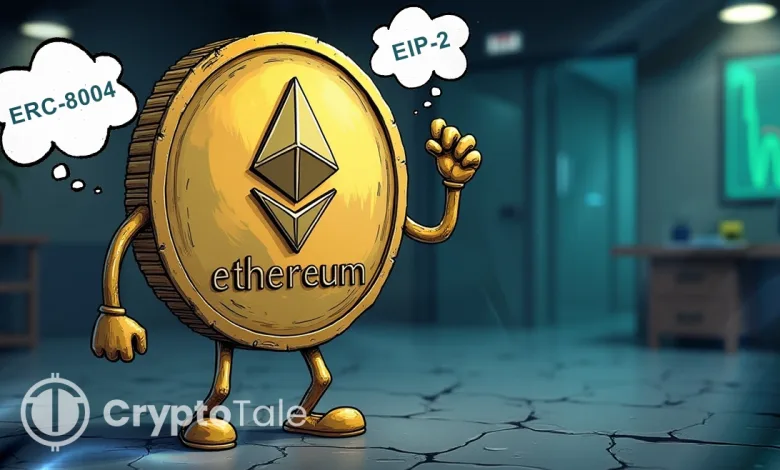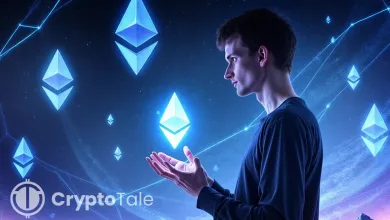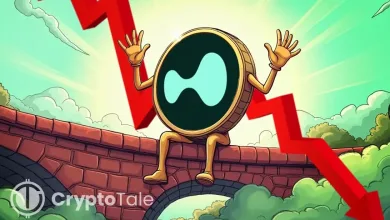Ethereum Unveils ERC-8004, EIP-2 to Power AI Agent Future

- ERC-8004 and EIP-2 set the Ethereum’s foundation for a decentralized AI agent economy.
- Stanczak said the standards will streamline identity, reputation, and payment systems.
- Ethereum and Virtuals aim to build a unified ecosystem for autonomous AI agents.
At ETHShanghai 2025, Ethereum Foundation Co-Executive Director Tomasz Stanczak unveiled ERC-8004 and EIP-2 as core frameworks driving Ethereum’s upcoming AI agent economy. The event, held in Shanghai, showcased how these standards could enable autonomous agents to verify identity, establish reputation, and process payments without intermediaries, laying the groundwork for a permissionless digital economy.
Frameworks Redefining AI Interaction
Stanczak explained that ERC-8004 adds a proxy feature that puts identity, reputation, and verification directly on the blockchain. This lets AI agents identify and trust each other without needing a central authority.
EIP-2, on the other hand, sets the rules for payments between these agents, making transactions open and automatic across Ethereum’s network. Together, they allow AI agents to trade and take part in decentralized economies on their own.
He added that these updates could make Ethereum’s systems more efficient than traditional finance since the network lets agents build trust, work together, and fund projects like infrastructure and education independently.
Institutional Interest and Upcoming Infrastructure
Stanczak mentioned that major global organizations are starting to look into how these Ethereum standards can be used. He said that over the next year or two, big infrastructure upgrades will make it easier to launch AI agents and connect payment systems more smoothly.
These updates will help developers create larger, more connected systems that run on autonomous AI agents. The Ethereum Foundation is encouraging collaboration between developer communities, businesses, and data teams to improve these efforts.
It also supports new initiatives like summer schools and global programs focusing on AI and agent-based technology. According to Stanczak, these community-driven activities are essential for creating the foundation of Ethereum’s intelligent economy.
ERC-8004 and Virtuals
ERC-8004, still in draft form, establishes registries for identity, reputation, and validation. It aims to create a “trustless” framework where AI agents interact and verify each other’s roles securely. This design makes it easy for different industries to work together without needing a central authority to verify everything.
The idea also fits well with Virtuals’ ACP framework, which helps AI systems communicate smoothly both on and off the blockchain. While ERC-8004 sets the basic trust and connection rules, Virtuals focuses on real-world uses like creating AI agents and managing marketplaces. Stanczak noted that both are meant to support a shared AI agent network, not compete with each other.
The Ethereum Foundation and Virtuals are said to be working together to strengthen this link. Virtuals’ AI agent marketplace could use ERC-8004’s on-chain registry to make systems more compatible and attract more developers. This integration aligns with Ethereum’s broader vision of becoming a neutral settlement layer for AI coordination.
Related: Ethereum Expands Into AI With dAI Team and ERC-8004 Standard
Permissionless Participation and Global Collaboration
Stanczak said that Ethereum’s future economy will become increasingly permissionless. Developers and institutions will be able to deploy AI agents capable of building credibility, managing payments, and contributing to local economies without relying on legacy banking systems. These AI agents could also work together on global tasks like maintaining infrastructure or supporting education, all through decentralized systems.
Stanczak also highlighted the creativity coming from Chinese developers, saying Ethereum recognizes their growing role in AI research and decentralized app building. He urged global teamwork to help grow Ethereum’s AI-driven economy.
In simple terms, ERC-8004 and EIP-2 set the rules for how AI agents talk, trade, and build trust in decentralized networks. Using them could make things easier for developers and help expand Ethereum’s ecosystem, paving the way for smarter, self-running systems on open networks.
Meanwhile, the introduction of ERC-8004 and EIP-2 is a step forward in Ethereum’s growth toward an AI-driven economy. Stanczak’s statements at ETHShanghai show Ethereum’s change from smart contracts to intelligent, autonomous systems. The upcoming infrastructure updates and institutional engagement suggest a fast-approaching phase where AI agents become integral to decentralized ecosystems.




